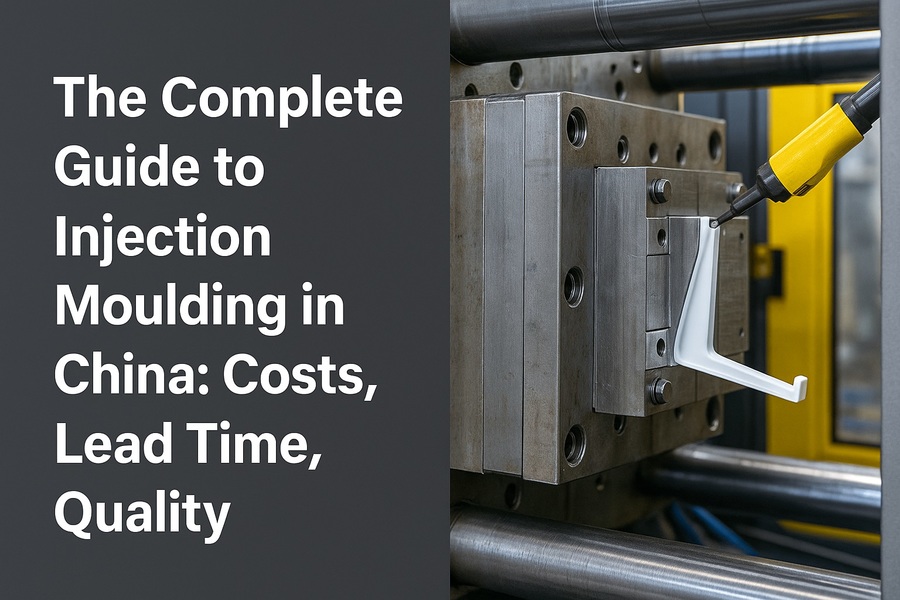When it comes to high-volume manufacturing with precision, nothing can match the efficiency of injection moulding, and China has become a global leader in delivering this service at scale. It is crucial to understand the process, cost, and timelines, regardless of whether you are a global brand increasing production or a startup creating your first product. From quality control to economic concerns, this blog explains all you need to know about injection moulding in China. As we go deeper, you'll discover information that can save your business money and time.

Melting plastic resin and pumping it into a mould allows injection moulding to produce accurate, repeatable parts. Over the years, Chinese manufacturers have refined this method by fusing large-scale manufacturing capabilities with contemporary machinery.
Choosing Chinese suppliers has several advantages, including:
● A large selection of plastic materials to meet individual part requirements
● Proficiency in tooling and mould fabrication
● Competitive price because of economies of scale
● Access to high-volume manufacturing with consistent quality
Because of this, China is a reliable partner for efficiently creating both basic and complicated components.
Although prices might vary based on a number of factors, China offers some of the lowest prices worldwide. Here is a general summary of the factors that impact the cost:
Mould cost
Depending on complexity and steel grade, it can range from around $2,000 to about $15,000.
Per-unit cost
For big production runs, it can be as low as about $0.10 to about $2.00 per item.
Selection of materials
High-performance polymers are more expensive than standard plastics like ABS.
Labour and setup
Compared to Western suppliers, China's comparatively cheap labour expenses result in lower setup fees.
Bulk production often leads to major cost savings per unit.
Fast turnaround times are a hallmark of Chinese manufacturers; however, lead time is influenced by a number of factors:
Tooling and mould design
Depending on complexity, this typically takes 3–5 weeks.
Sample production and approval
Initial samples (T1, T2 revisions) take 1-2 weeks.
Mass production
1–3 weeks for the first batch after mould approval
Timelines may be delayed by the following:
● Technical drawings that are unclear or incomplete
● Midway through a project, the mould design is altered
● Public holidays (like Chinese New Year)
Delays may be considerably decreased with effective communication and unambiguous documentation.
Top-tier moulding manufacturers in China make significant investments in quality control to satisfy international requirements. This is how they uphold quality:
● Material verification- to guarantee resin uniformity
● CMM (Coordinate Measuring Machines)- for dimension inspection
● First Article Inspection (FAI)- before mass production
● Batch testing- for durability, strength, and visual flaws
By collaborating with a manufacturer that offers clear reports, certifications (such as ISO 9001), and on-site audits, you can keep quality constant from batch to batch.
China's injection moulding provides an unmatched combination of quality, speed, and cost effectiveness. Chinese manufacturers are able to meet strict criteria while keeping prices reasonable from tooling to final delivery. Success, however, depends on picking a partner who is aware of your product and business goals. Many of these manufacturers also provide rapid prototyping services to businesses that require quick design validation prior to full production, which helps you iterate rapidly and prevent expensive mistakes.
Think carefully about your options, as the decisions you make now will affect the future of your product.
Which materials are often utilised in injection moulding in China?
Materials including ABS, nylon, TPU, polypropylene (PP), and polycarbonate (PC) are often used by Chinese producers. The choice is based on the strength, flexibility, and durability requirements of your product.
In China, how long does it take to produce a plastic mould?
Depending on the grade of steel and the complexity of the design, making a mould usually takes three to five weeks. Moreover, it may take a little longer for precision tooling.
Can I make a small production run request?
Yes, a lot of Chinese suppliers are open to small quantities, particularly when paired with pilot production or prototyping stages. It's perfect for testing new concepts before scaling.
Do foreign machines work with Chinese moulds?
The majority of China-made moulds are compatible with injection moulding equipment globally and adhere to international standards. Make sure to confirm compatibility at every stage of the design process.
Before manufacturing begins, is it possible to visit the factory?
Yes. Many manufacturers support audits and on-site inspections, which let you check facilities, get to know the staff, and make sure they live up to your requirements for quality.